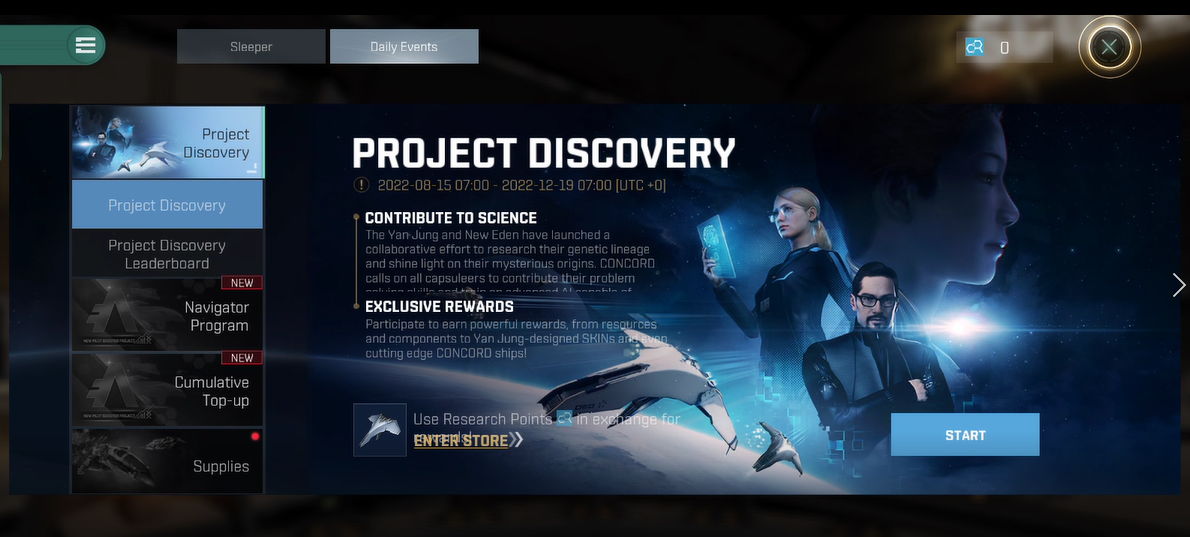All in the game: VIB-UGent researchers enlist virtual space explorers to improve disease diagnostics
By harnessing the power of thousands of gamers, the team of Prof. Lennart Martens (VIB-UGent Center for Medical Biotechnology), with colleagues of Dhaenes lab of the Faculty of Pharmaceutical Sciences at Ghent University, intends to improve the analysis of mass spectrometry data drastically. In turn, this may advance disease diagnostics.
Integrated citizen science
Most citizen science projects stand on their own. As a result, their bottleneck is often finding and engaging enough participants. But what if we could tap into an already established large audience? Say, gamers of a very popular massively multiplayer online role-playing game (MMORPG)?
That's the idea behind the collaboration between the team of Prof. Lennart Martens (VIB-UGent Center for Medical Biotechnology) and NetEase, the developers of EVE Echoes, a mobile space exploration game with millions of players around the globe – a number that would be very hard to get in 'traditional' citizen science projects. It will be the first time scientific research is integrated into a mobile game at this scale.
Toon Callens and Tine Claeys at the Martens lab worked out the overall concept of how to integrate real-life data and graphs generated by Dr. Maarten Dhaenens and Dr. Sander Willems (Dhaenens lab, UGent) into the game. When the idea was worked out, a programming effort by Toon Callens, Natalia Tichshenko, and MMOS, a company specialized in connecting scientific research to video games, made sure the scientific data could seamlessly integrate into EVE Echoes.
Maarten Dhaenens: "I have been looking at mass spectrometry data for over fifteen years myself, but now I will never feel alone again."
Toon Callens: "It was necessary to build a tool that automatically divides the millions of data points into playable games without losing their scientific relevance. And as I enjoy playing games myself, this endeavor perfectly combines my passion for scientific research and gaming."
Connect the dots
The idea is to present the players with a puzzle. Only this puzzle is based on real mass spectrometry data. Mass spectrometry is a technology that allows researchers to separate and identify the molecules in a sample based on how heavy they are. First, scientists ionize the sample, which gives the molecules a small electrical charge. Then, these ions are moved under the influence of an electromagnetic field that pushes them toward a detector. Heavier molecules are harder to push. Eventually, the scientists end up with a graph with different peaks for every moment a molecule reaches the detector. Combinations of these peaks tell us which molecules are in the sample and how many of each there are.
One major application of this analytical technique is to study differences in protein expression between healthy volunteers and patient samples, for example, to find new diagnostic markers. But to do that, millions of measured ions need to be matched between dozens of different samples, a computationally daunting task.
Because people are masters at pattern recognition, the gamers will help to match different mass spectrometry graphs by moving and rotating them. Each matching task is given to several gamers so that if the majority comes to the same solution, that's the ‘right’ solution. If there is not enough agreement between different players for certain puzzles, these data are further analyzed. The Martens team will then pit the gamers' solution against the current best machine learning models that do the same and use the gamers' data to train even better machine learning models.
Lennart Martens: "While machine learning, our expertise, provides a fascinating means to teach a computer how to automate highly complex tasks, a key ingredient is sufficient training data. Without such training data, a machine learning algorithm is essentially useless. That is where this exciting new project comes in: it will obtain a unique and super interesting training data set that we, and by extension our entire community, will be able to make excellent use of for years to come."
The final frontier?
This can also increase the overall understanding of mass spectrometry data because, apart from the interesting signal, much noise is produced during measurements. The interactive nature of MMORPGs and the well-known engagement of gaming communities also give the researchers plenty of opportunities to communicate about their work and raise interest in STEM in general, and life sciences research in particular. The researchers will work on this through educational materials, puzzle challenges, behind-the-scenes videos, and so on.
Lennart Martens: "This is just a first step in an ongoing effort to achieve two major, mutually compatible goals: to create novel tools that help us see our data in new and exciting ways, and to reach out to as large an audience as possible for science education and active participation. It's high time we get our science out of the ivory tower and onto your smartphone! Game on!"
Screenshots of Project Discovery in EVE Echoes, with two puzzle examples.
Learn more about the game here and download it in the App Store or Via Google Play.
Joran Lauwers
Gunnar De Winter






